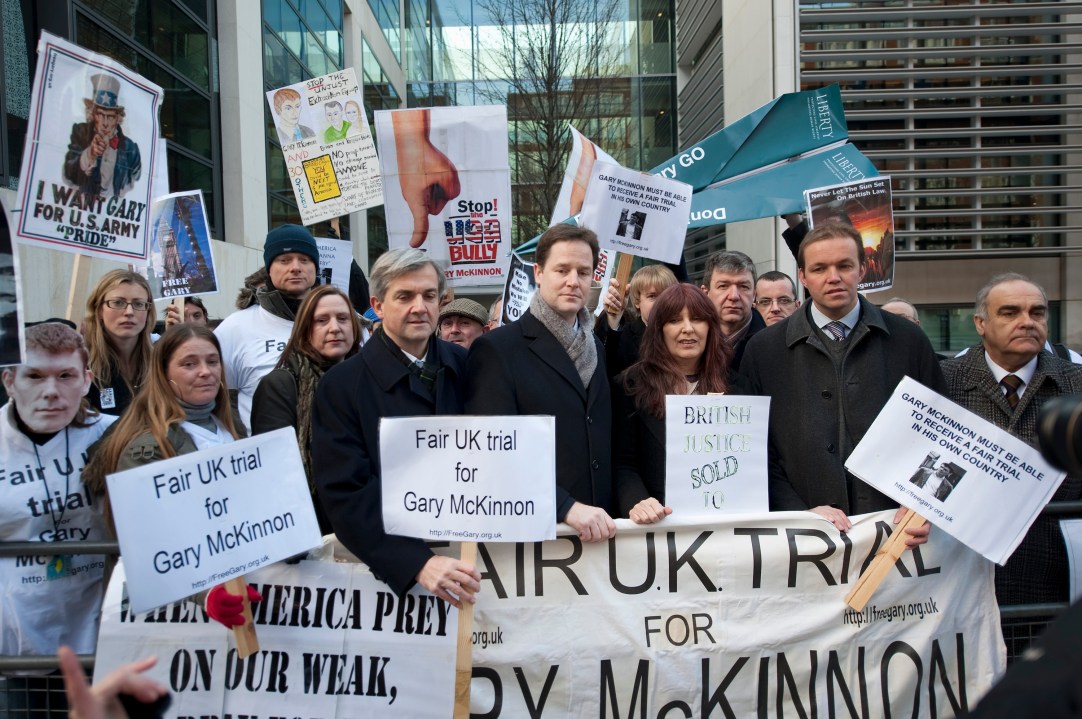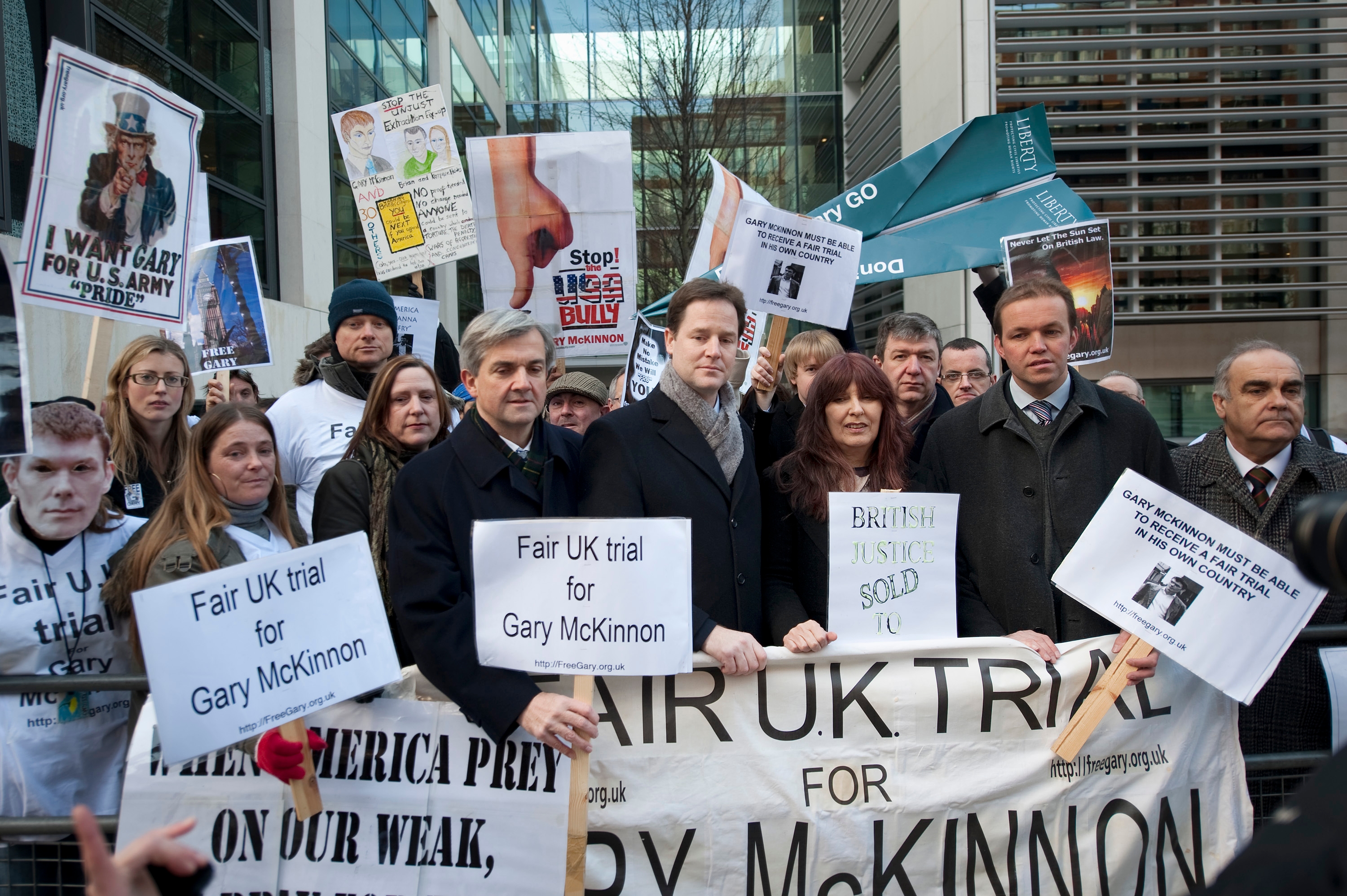See them there? That’s Nick Clegg and Chris Huhne rallying for Gary McKinnon before the last election. This alone should have been enough to persuade the Daily Mail to rethink its mighty campaign on behalf of Mr McKinnon. Apparently not, however, and so the Home Secretary today passed her responsibilities to Paul Dacre and bravely agreed with the editor of the most powerful newspaper in Britain. Accordingly, Gary McKinnon will not be extradited to the United States.
Technically, Mrs May found that extraditing Mr McKinnon would breach his human rights. Relying on the much-hated (not least by the Daily Mail) Human Rights Act the Home Secretary concluded that the combination of McKinnon’s Aspergers’ and his apparently persuasive threat to kill himself if extradited meant that she had no choice but to thwart American efforts to put him on trial in the United States. Annoying Washington is less dangerous than angering Mr Dacre.
Poor old Babar Ahmad and Talha Ahsan eh? Their appeals against extradition to the US did not enjoy such powerful patrons. No wonder there’s more than a whiff of double-standards about this case, not least since Ahsan also has Aspergers.
Now, as David Allen Green observes, if McKinnon’s suicide-threat is credible then the Home Secretary may have acted correctly. But as he also notes denying the extradition on those grounds and no others suggests the legal case for McKinnon’s extradition, absent any complicating factor such as his health, was watertight.
As it should be. McKinnon was not, whatever some people want you to believe, some innocent kid who inadvertently blundered into the Pentagon’s computers in search of evidence of UFOs. On the contrary there is ample evidence – not the least of which comes from his own statements – that his hacking was a politically-motivated action. It Was McKinnon who left a message on a US army computer he had infiltrated which read:
“US foreign policy is akin to Government-sponsored terrorism these days … It was not a mistake that there was a huge security stand down on September 11 last year … I am SOLO. I will continue to disrupt at the highest levels … “
Indeed, part of his defence was that he could not receive a fair trial in the United States because his political beliefs would make that impossible. But, as Lord Justice Maurice Kay wrote in 2007:
The relevant question under section 81(b) is not whether Mr McKinnon did what he is alleged to have done by reason of his political opinions. It is whether his political opinions (whatever they may be) are such that he would suffer prejudice at the hands of an American judge and jury. There is no evidence and absolutely no reason to suppose that Mr McKinnon might suffer prejudice of this sort.
Nor, despite what people seem to believe, would McKinnon have potentially faced the death penalty had he stood trial in the United States. Nor, for that matter, would he even have necessarily served his sentence in the United States. An agreement or understanding that he would be imprisoned in the United Kingdom was easily obtained.
As for the notion he should be tried in England, not the United States. Well, the District Court judge put that well too:
The CPS did consider whether to launch a prosecution in the UK and for good reason decided against it. The defendant intentionally targeted computers in the US; his actions resulted in criminal damage being suffered there, as well as causing very considerable disruption to the workings of those computers resulting in interference and disruption to military activities in the US. It is not my task to determine which state has the better right to prosecute, but for what it is worth my view is, unquestionably, if the defendant is to face prosecution, it should be in the US.”
The crime – and McKinnon does not deny committing crimes – was committed in the United States. It targeted US military hardware. The damage was done in the United States. That McKinnon did this damage from a computer in the United Kingdom seems wholly unimportant to me.
Suppose, by way of a comparison, you lived on one side of a border and lobbed bricks through the window of your neighbour whose house lies on the other side of the border. In which jurisdiction should you stand trial for the damage you have caused? It seems to me you should stand trial in the jurisdiction in which the damage was done.
As for the notion McKinnon could not receive a fair trial in the United States? Well that too is poppycock. If it weren’t or if we did not think the Americans could just about manage to organise a non-kangaroo court we would not extradite anyone to the US. Nor would McKinnon necessarily have been too harshly punished in the US. As the judges made clear in that 2007 ruling:
As in our jurisdiction, the Canadian courts require exceptional circumstances if a bar to extradition is to be established on this basis. They use the test of whether the potential sentences in a requesting state would “shock the conscience” of Canadians. We find that a useful yardstick in the present context. We do not consider that it has been achieved in this case. In our view Mr Lawson has tended to understate the gravity of the offences which Mr McKinnon is alleged to have committed. At the same time he has tended to overlook the fact that, if prosecuted and convicted, the equivalent domestic offences include the offence under section 12 of the Aviation and Maritime Security Act 1990 for which the maximum sentence is life imprisonment.
Quite. So it is just as well for McKinnon that he now has just the kind of “supervening illness” that permitted him to appeal, yet again, his extradition. Poor man. I hope he recovers. But, illness or not, he is not an innocent child bewildered by all this fuss and most of the arguments against his extradiction seem, to these layman’s eyes at least, largely bogus.
This being so, I am surprised by the reaction of some conservative commentators. Benedict Brogan, for instance, salutes Home Secretary thus:
By rejecting the extradition order on Gary MacKinnon – the first time a Home Secretary has blocked an extradition – she has won the admiration of those Tory backbenchers clamouring for a more robust and unilateralist approach to issues of national sovereignty. She has allowed the Government to present itself as a fair-minded ally of the underdog.
Alternatively, the Home Secretary has pandered to the anti-American snobbishness of the mob. And, anyway, when did “national sovereignty” mean it’s fine to attack our allies’ defence infrastructure?
Finally, everyone seems to agree that the US-UK extradition treaty is “unbalanced“. But is it really? I am no expert in these matters but found this ConservativeHome piece by Ted Bromund rather interesting:
[T]he principles of the 2003 Treaty are sound and fair, and are in fact a model for the entire U.K. extradition system. The Treaty is based on dual criminality – that is, no Briton can be extradited to the U.S. for something that is not a crime in Britain. It has a proportionality standard, meaning that no Briton can be extradited to the U.S. for unpaid parking tickets. And it has an objective evidentiary standard that is as nearly identical for both countries as our different systems allow. For extraditions from the U.S., the standard is ‘probable cause,’ which has a clear meaning in the U.S. legal system. For extraditions from the U.K., the standard is ‘reasonable suspicion,’ which has an equally clear meaning in Britain. The only difference is that the U.S. standard is contained in the Treaty itself, whereas the British one is contained in Britain’s underlying legislation, the 2003 Extradition Act, as amended.
Is he right? In any case, Gary McKinnon is fortunate to have such powerful supporters. By which I mean, naturally, Paul Dacre and not Nick Clegg.








Comments